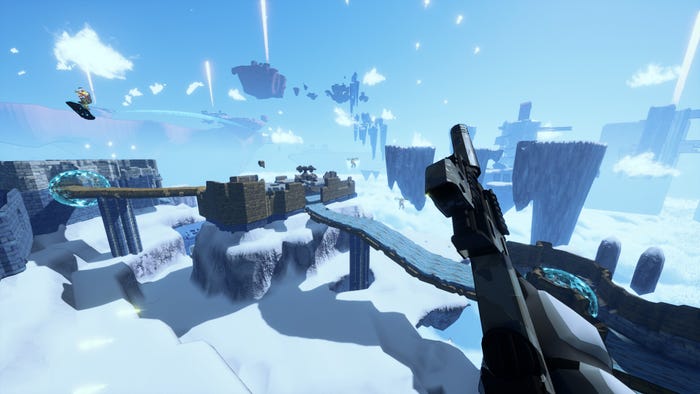Case study: How to launch on Epic Games Store with Hybrid Cloud Hosting
Sponsored: Developing and operating a multiplayer game is a notoriously complex, time-consuming and expensive business. And when you launch your title on the Epic Games Store the stakes are high and the world is watching.

Sponsored by Improbable
Developing and operating a multiplayer game is a notoriously complex, time-consuming and expensive business. And when you launch your title on the Epic Games Store (EGS) the stakes are high and the world is watching.
- - -
Game studio RETO MOTO planned to launch their competitive free-to-play game Heroes & Generals on EGS and deliver a flawless live experience to players around the world while minimising their hosting costs.
There was a lot to do. They’d need a new, more flexible and cost-efficient hosting set up. They’d need to ensure that the game would scale to meet high demand. And they’d need to prepare the game while collaborating with partners across the world – most of whom were working from home due to the pandemic.
Defining objectives
Building on the initial success of their competitive first-person shooter Heroes & Generals, RETO MOTO wanted to launch this free-to-play title on EGS. To do this, they’d need to scale up reliably and on demand, and deliver low-latency gameplay to a global player base.
The studio approached Improbable because our game server orchestration technology – zeuz – would enable RETO MOTO to meet the unprecedented demand for their game while at the same time keep hosting and operations costs to a minimum. Also, they knew we work with Epic Games regularly, so we’d know how to fulfil the technical requirements.
Identifying challenges
Built using RETO MOTO’s own engine, Heroes & Generals had previously been hosted and manually managed on bare-metal game servers through up to six different providers simultaneously. When you launch on EGS, however, you never know for sure how demand might fluctuate. Get your forecasts wrong and, with a fixed number of bare-metal servers available, you will either disappoint players if demand is too high, or pay for idle servers if it fails to materialise.
Technical difficulties aside, the biggest challenge was organisational. Developers in Denmark would need to collaborate with engineers in London and Munich who would, in turn, have to coordinate with a network of hosting locations stretching from Europe and Russia, to Australia and the Americas.
And with the COVID-19 pandemic rapidly spreading, it was clear the entire collaborative effort would require everyone to work remotely.

Understanding requirements
With these challenges in mind, we sat down with RETO MOTO to establish effective ways of working together and to understand the different technical components involved in migrating the game to zeuz.
Our discussion ranged from the exact content and structure of their existing custom game engine to the specifics of their hosting configuration and back-end functions.
Our engineering teams then took a deep dive into the studio’s game server binary, analysing the back-end stack to define how they would integrate the game’s custom matchmaking solution with the zeuz API and game server orchestration software.
Once the infrastructure requirements were defined, our hosting and operations teams established two main workstreams to fulfil the key objective:
Integration: onboarding and managing the hybrid hosting platform and integrating the game server orchestration technology
Dedicated testing: simultaneous to managed hosting, setting up a separate environment to run live tests and solve issues before launch
Results
Low-latency hybrid hosting platform scaled to serve a significant increase of concurrent players with no impact to the game experience
Switching from bare metal to hybrid hosting established a robust framework which reduced costs by up to 50%
Managed hosting freed up the RETO MOTO development teams to focus on their game content and services rather than back-end technology
Fast integration with EGS and our API
 Co-developing with clarity
Co-developing with clarity

Working together, we agreed the co-development objectives, approach and acceptance criteria, and drew a clear roadmap that would lead us to launch day.
Clear communication channels were then established that would make collaborating across geographies and time zones efficient and low-stress, with a natural cadence of catch-up meetings throughout the project.
As a result, everybody involved was able to work swiftly, identifying and addressing potential issues before they could turn into problems.
For example, if the studio needed a new feature on the platform, we’d learn about this in the daily catch-up, discuss and define requirements, then brief our engineering teams to get it built, ready for implementation and testing.
Stress-testing the game
Our teams built a test hosting environment to duplicate the live Heroes & Generals game stack. This was a cloud-hosted mirror of the existing back end, and let us conduct scale tests and playtests without risking the live player experience.
RETO MOTO needed to be sure they could accommodate a surge in demand come launch day, serving matches at expected rates and avoiding queue build-ups. To test the resilience of the new hosting framework, we pushed the game’s scale threshold to twice the capacity its developers thought they might need.
The test environment proved so useful that the dev team asked to keep the environment running so that they could continue to experiment with new features and scenarios in the future.
Improbable Hybrid Cloud Hosting
Hybrid Cloud Hosting is a container-based hybrid of bare-metal and cloud servers. And because we're provider agnostic and able to integrate with multiple cloud servers simultaneously, we offer resilience, flexibility and the opportunity for low-latency gameplay to new players around the world – even in hard-to-reach markets like South America, Australia and Russia.

Flexible
Deploying Hybrid Cloud Hosting using specialist expertise, we can tailor the solution to meet the specific needs of the game and its launch.
Scalable and resilient
The platform uses robust game server orchestration technology which enables it to scale responsively and dynamically with low latency for massive multiplayer experiences.
Cost effective
By hosting the game on bare metal and only using cloud when demand spikes, the platform minimises cloud usage and server redundancy to reduce hosting costs by up to 50%.
Quick to migrate and integrate
Our team helped RETO MOTO to migrate their game platform in under three months. We minimise integration time using quality SDKs, with our engineers on hand to solve technical issues so that the studio can focus on their game.
Low-latency performance
With over 200 locations worldwide, Hybrid Cloud Hosting allows studios to host games closer to players for low latency performance. the game and its launch.

Maximising potential, minimising risk
To ensure RETO MOTO got – and continues to get – the most effective and cost-efficient server mix, we use our scaling algorithm to optimise it on a continual basis.
 This ongoing optimisation enables RETO MOTO to deliver the best possible player experience, keep control of their costs, and get the best possible return on their investment. Extensive cost forecasting showed that migrating to Hybrid Cloud Hosting will save the studio up to 50% compared to cloud-only hosting.
This ongoing optimisation enables RETO MOTO to deliver the best possible player experience, keep control of their costs, and get the best possible return on their investment. Extensive cost forecasting showed that migrating to Hybrid Cloud Hosting will save the studio up to 50% compared to cloud-only hosting.
Successful partnership through collaboration
With the right hosting set-up, rigorous testing and close co-development support, RETO MOTO knew they could deliver smooth, low-latency gameplay at launch.
In turn, our strong partnership freed the studio to focus on preparing their game content and services for integration with the Epic Games Store, making sure that Heroes & Generals was ready to hit the big time at launch – and beyond.
Find out more about Improbable Hybrid Cloud Hosting and other game development tools and resources here.
Read more about:
Sponsor Resource CenterAbout the Author
You May Also Like









